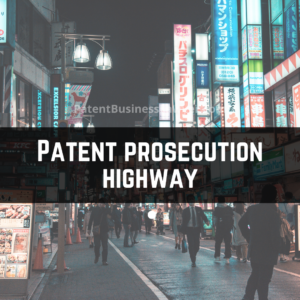
Why Full Stack AI Companies Pay 25x Revenue Multiples
Here I discuss why Full Stack AI companies pay 25x revenue multiples by building a strong full stack AI patent portfolio.

The patent law in Japan has provisions similar to the patent law in India as discussed here for patent filing. The aim is to understand a comparison of the Indian Patent Law with the Patent Laws in the Asia Pacific Regions, specifically Japan. The patent office of Japan or the JPO is well known worldwide for establishing best practices and procedures for effective patent registration process. In May 2020, the Patent Prosecution Highway (PPH) program for better patent cooperation between Japan and Taiwan has been made permanently effective.
Before filing a patent in India and Japan, patent applicants need to review the conditions or the criteria of patentability. In essence, subject matter eligible for patent grant and conditions of patentability in Japan include the invention that are highly advanced creations of technical ideas by which a law of nature is utilized which is granted by the Japanese Patent Law Regulator, i.e., the Japan Patent Office (IPO), whereas in India new product or process involving an inventive step and capable of novelty and industrial application can be patented which is granted by the Indian Patent Law Regulators, i.e., The Patent Office or the Intellectual Property Appellate Board (IPAB).
To felicitate patent filing in Japan, Japan has established Japan Patent Office (JPO), where a Japanese citizen can file his/ her patent application, same goes for Indian citizens who can file for patent grant at the Indian Patent Office (IPO). Both the Patent Offices facilitate e-filing of patent application and charges a considerable data entry fee for paper application. But in Japan, PCT application may not be filed electronically.
In India, while filing for patent, the applicant may file a provisional application, i.e. the summary of the invention and is filed to protect the invention at its early stage either through e-filing or physically by paying a requisite fee. The complete application has to be filed within a period of 12 months from the date of filing of the provisional application or else the application will be considered to be abandoned. But in Japan, there is no option to file for a provisional application. The applicant is bound to file the complete patent application at once. Japanese patent applications can assert domestic priority based on previously filed Japanese patent applications. Thereafter, a certified priority document must be filed within 16 months from the first filing date of a priority based application.
The Japanese Patent Office provides a search database to search for patents and utility models. This database is used to conduct prior art searches to determine the patentability or patent eligibility. In addition, this patent search database is used to conduct patent infringement studies to determine patent infringement with claim mapping and freedom to operate search projects to determine product clearance.
Japan has implemented the first-to-file system, i.e. the regulation that where two parties apply for a patent for the identical invention, the first party to file will be granted the patent. An application document submitted to the Japan Patent Office will be verified to see whether it fulfills the necessary procedural and formal requirements. The JPO will publish the particulars of an application in the Official Gazette after Eighteen months have gone from the date of filing.
Patent applications are not essentially examined. An examination will be conceded out only for the application for which the applicant or a third party has filed a request for examination and paid the examination fees. Any application for which a request for examination has not been filed within a period of *three years from filing date will automatically be regarded as withdrawal and cannot be patented thereafter.
If the examiner finds reasons for refusal, a notification to this result will be sent to the applicant. As a result of the examination, the examiner will make a decision to grant a patent as the final assessment of the examination stage if no reasons for refusal have been found. The examiner will also make the same decision if the reasons for refusal have been eliminated by an argument or amendment.
In Japan, the Japan Patent Act amended in 2014 made it possible to file an opposition to a patent included in the Official Gazette published on or after the date of enforcement of the Act.
Therefore, when a third party desires to oppose a patent, it is essential to file a notice of opposition within six months from the date when the Japanese patent was published on the Patent Gazette. There is no remedy, for the opponent, for missing the six months deadline.
In India, once the complete specification of the patent applicant is published, an opposition to that patent can be made via two stage, fist pre-grant opposition and second post-grant opposition. Pre-Grant Opposition can be made by ANY PERSON within a period of three months from the date of publication of complete specification or before the grant of patent whichever is later and Post Grant Opposition can only be made by ANY PERSON INTERESTED before the expiry of one year from the date of grant of patent.
Section 84(1) of the Indian Patent Act, 1970 deals with compulsory licensing whereas, Article 932 of the Japanese Patent Act, 1959 (Award granting nonexclusive license for public interest) deals with the provision for compulsory licensing.
In Japan, there are no precedents where a compulsory license was granted for the import or export of medical drugs. The Japanese Patent Act does not unambiguously authorize any party, even the government, to take advantage of a patented invention without a license, whereas, in India the Indian Patent Act, 1970 allows any interested person after expiry of 3 years from the date of grant of patent, may make an application to the Controller for grant of compulsory license.
Patent law in India mandates each patentee and licensee of the patent to submit each year, information about the coverage to which the patented invention has been worked on a commercial scale in India. This information is to be put forward in accordance with Form-27. Many faults however, have been observed in the format of the Form-27. Patentee who fails to abide with this requirement is legally responsible for penalty. Requirement for reporting of working of patents is not prescribed in Japanese Patent Law.
The Intellectual Property (IP) High Court was established on 1 April 2005, in order to accelerate and reduce the costs of patent litigation in Japan. The IP High Court hears appeals from district courts in Japan on patent actions and suits against appeal/trial decisions made by the Japan Patent Office (JPO).
Whereas, in India at present there are no such types of courts that are established for specifically adjudicating matter related with Intellectual Property rights. Newly created Commercial Courts in India can handle Intellectual Property disputes worth less than 1,00,00,000/-
**********
Advocate Rahul Dev is a Patent Attorney & International Business Lawyer practicing Technology, Intellectual Property & Corporate Laws. He is reachable at rd (at) patentbusinesslawyer (dot) com & @rdpatentlawyer on Twitter.
Quoted in and contributed to 50+ national & international publications (Bloomberg, FirstPost, SwissInfo, Outlook Money, Yahoo News, Times of India, Economic Times, Business Standard, Quartz, Global Legal Post, International Bar Association, LawAsia, BioSpectrum Asia, Digital News Asia, e27, Leaders Speak, Entrepreneur India, VCCircle, AutoTech).
Regularly invited to speak at international & national platforms (conferences, TV channels, seminars, corporate trainings, government workshops) on technology, patents, business strategy, legal developments, leadership & management.

Here I discuss why Full Stack AI companies pay 25x revenue multiples by building a strong full stack AI patent portfolio.

Here I discuss digital asset regulations and compliance in 2025 along with tokenization process to launch your own tokens.

Here I write about advanced patent claim drafting for machine learning patents and what patent examiners exactly look for.

How to develop international patent filing strategy for AI interface detection patents to protect your AI detection tech globally.

Here I discuss AI Interface Detection Inventions and how to perform patent eligibility analysis for digital AI innovations.

A complete guide about AI interface detection innovations and writing strong patents for AI interface detection technology.

An extensive guide to launch blockchain gaming platforms covering writing technical whitepapers and technology landscape.

Guide to design invention prototype and development of invention prototype with international patent filing for inventors.

Case study for writing technical content using proven methods for technical content development and FAQ optimization.

Writing legal opinion letters for AI Token Projects and crypto projects with AI assets and AI coins for regulatory compliance.